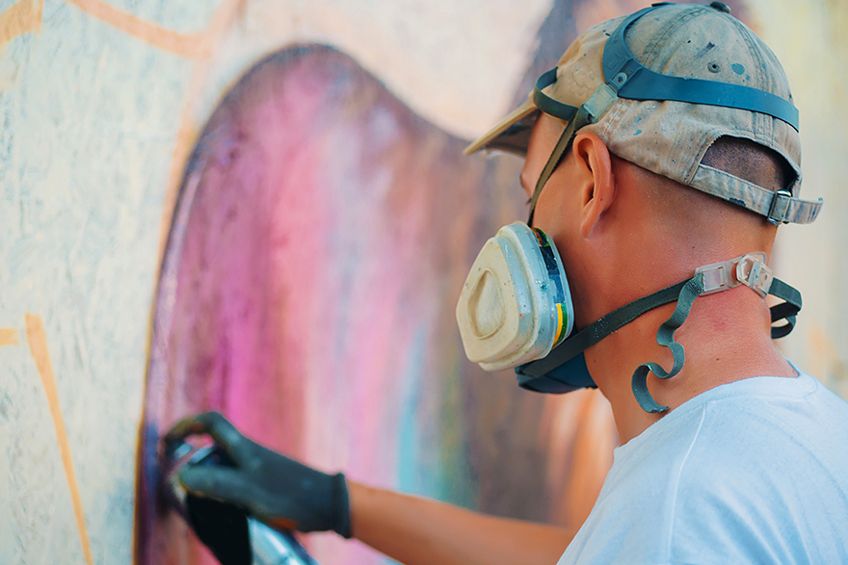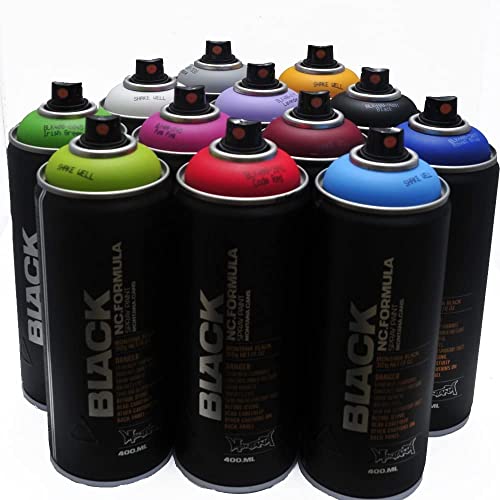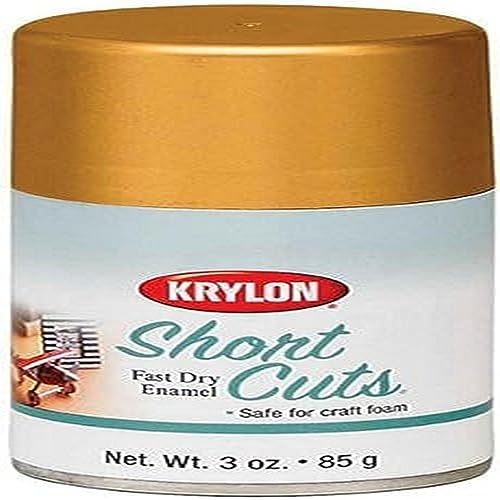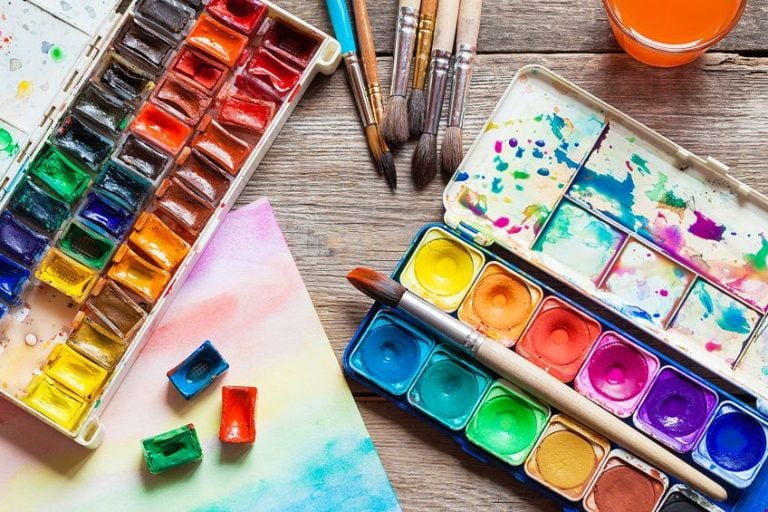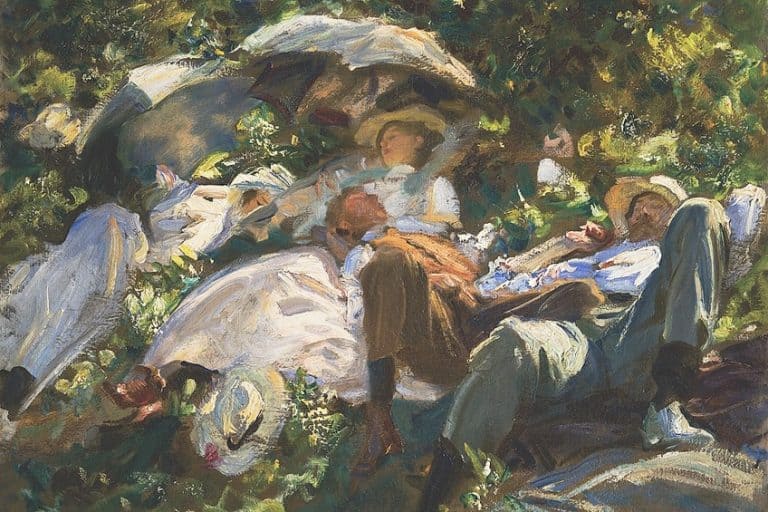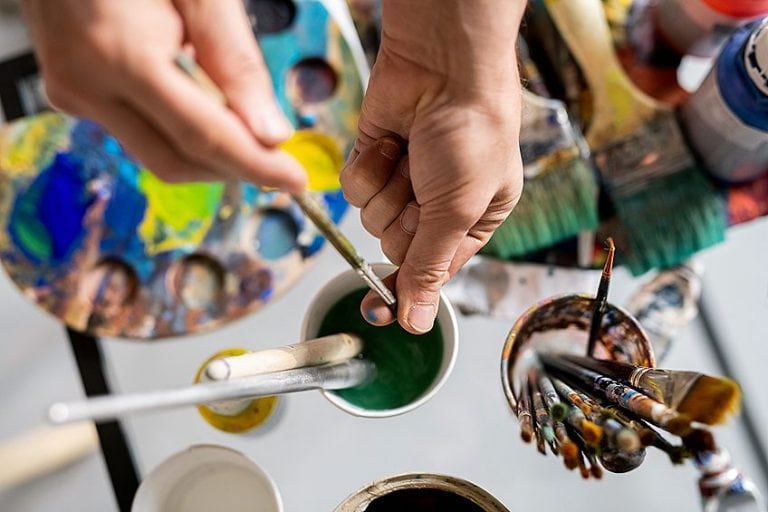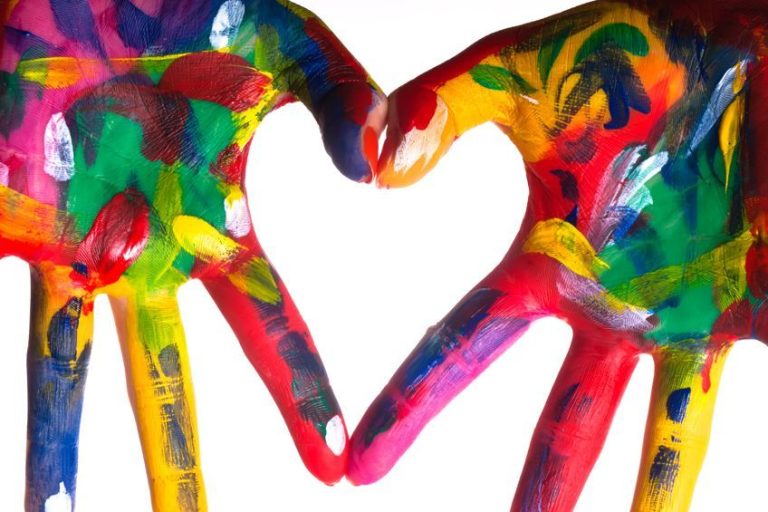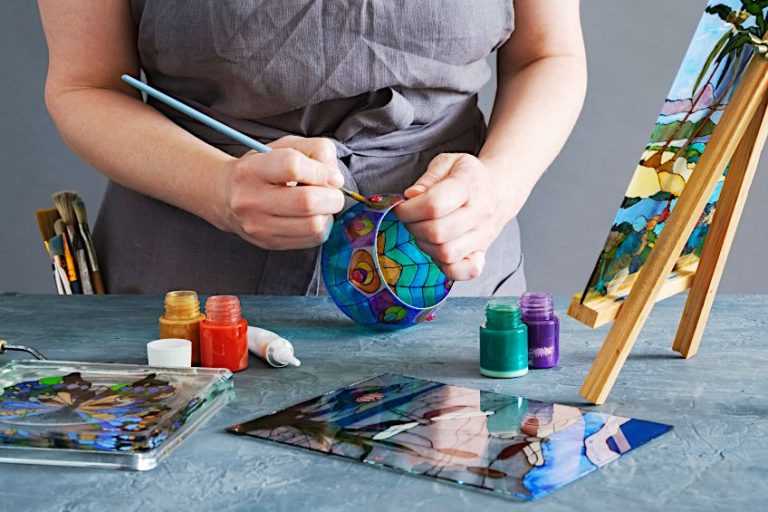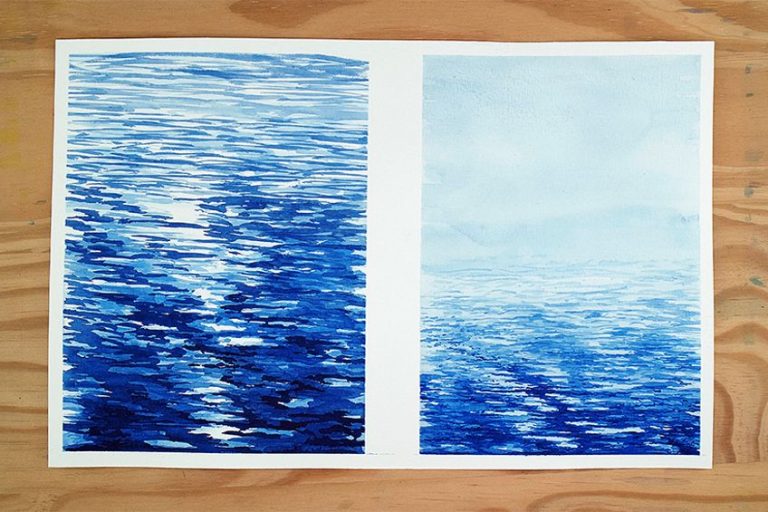Spray Paint Art – Exploring Exciting Spray Paint Art Techniques
We have all seen spray paint art! Take street spray painting art, for example. In many cities, murals on the sides of buildings and walls were all created using cans of spray paint. Many of these art pieces are so intricate and detailed that it is almost hard to believe they were painted with spray paint! If you have ever wanted to learn how to do spray paint art yourself, be it on a wall or even spray painting canvas, then keep reading as we touch on a few topics such as spray painting for beginners, how to use spray paint, and even spray paint art techniques!
What Exactly Is Spray Paint Art?
Back in the 1940s, paint salesman Ed Seymore created the very first spray can together with his wife. Their spray was used to help demonstrate the aluminum paint Ed had developed at the time. As the years went by, furnishing and automobile industries began using spray paint and it continued to gain popularity. While we are not entirely certain when and who began what is known today as graffiti, in the 1960s the name tag ‘Cornbread’ was spray-painted all over an American town by a boy.
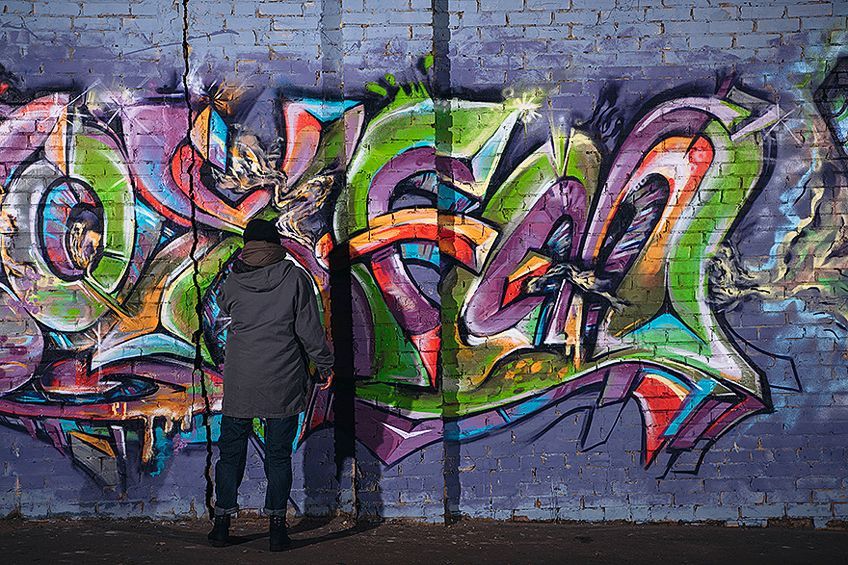
Fast forward to the 1980s in Mexico City, an artist named Ruben Sadot Fernandez shared his artwork in what was somewhat a public experiment of sorts, his creations became very popular. His art was, and that of many street spray painting artists today is actually done live in front of an audience of people on the street. It is also known as aerosolgrafia and today it is often considered to be a political expressionist statement.
As time has gone by, street spray painting art, also known as graffiti, boomed in popularity. Unfortunately, many took to the streets and tagged private or government property such as trains and even statues. These acts of vandalism have given street spray painting artists a bad name. Today, there are many legal places where one can use their spray paint art techniques, and many artists are paid to create art or signage! For those of us without a wall to decorate, it is possible to create a spray painting on canvas. The best part about spray painting? There are no real rules!
Keep reading for our spray paint tutorial on spray painting for beginners as well as spray paint art techniques and soon, you will know how to make spray paint art too!
Our Top Spray Paint Art Products
Of course, if you already are an intermediate or advanced spray paint artist, you likely already have your favorite products to use. For those still learning or just beginning, the world of spray paint can be quite daunting indeed! Here are three of our favorite recommended spray paints.
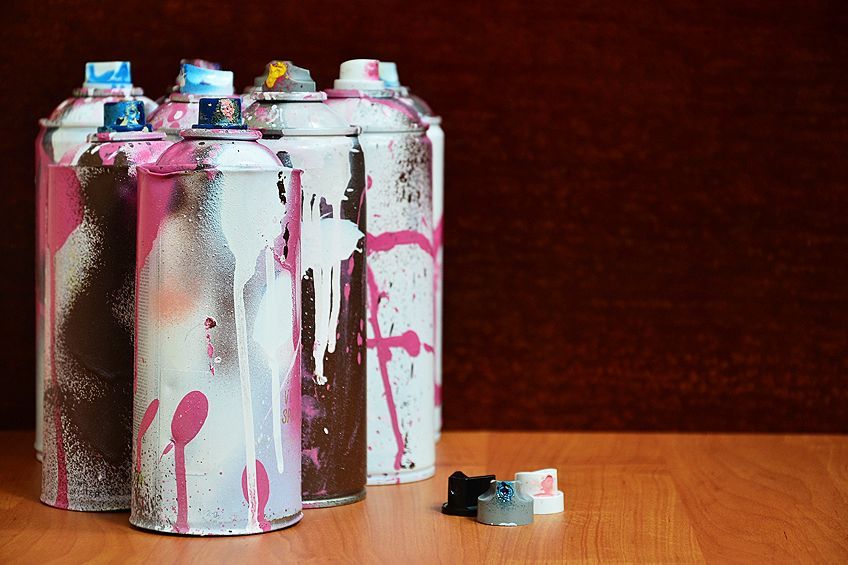
Top Choice Spray Paint: MONTANA BLACK Graffiti Spray Paint
One of the most popular choices in spray paints, The Montana Black Spray Paint is used by many artists, it is even suitable for spray painting for beginners! Montana Black offers a very high-quality product with a high-pressure design, making it perfect for murals and other street art. Fast drying and providing good coverage, these quality paints are available in many colors. For those doing street spray painting art or murals, Montana Black is the perfect spray paint option.
- Set of 400ml spray paint cans comes with 12 popular colors
- High-pressure spray paint cans designed for street and mural art
- Provides high-quality coverage with a fast-drying formula
PROS
- Top of the range paint
- Wide range of colors
- Easy to use
- Excellent surface area coverage
- Hardy and resistant to weather
CONS
- Nozzle clogs easily
- Higher price range
Most Popular Spray Paint: RUST-OLEUM Painter’s Touch Ultra Cover
Rust-Oleum is almost always listed as a favorite paint product, with good reason! This household name is well known for its wide range of spray paints and is perfect for both outdoor or indoor spray-painting projects as well as for graffiti art. The Rust-Oleum Painter’s Touch spray paint is not only extremely durable and of course, affordable, but it is also available in many different colors and a wide variety of finishes. This much-loved product is durable, top quality, and provides excellent coverage.
- Versatile and suitable for a range of different surfaces
- The long-lasting oil-based formula is low odor and chip-resistant
- Provides a glossy finish and dries to the touch in 20 minutes
PROS
- Mid-Price range
- Highly durable
- Excellent coverage
- Easy to use
- Fast to dry
- Wide variety of colors and finishes
CONS
- Pungent Fumes
- Can clog easily
Best Craft Spray Paint: KRYLON Short Cuts Aerosol Spray Paint
This fast-drying enamel-based paint is extremely versatile and works well on many different types of surfaces which include metal, paper, plastic, wood, and even craft foam. While it is only available in smaller quantities, the finish is smooth and even while also being acid-free and completely archival-safe.
- Provides an elegant and smooth finish with a high-gloss
- Acid-free, archival safe, and dries very quickly
- Perfect for a range of surfaces for arts and crafts projects
PROS
- Dries quickly
- Even a smooth application
- Highly versatile
CONS
- Produces fumes
- Can size is small
Other Supplies for Spray Paint Art
When you first start learning how to use spray paint and how to do spray paint art, supplies will easily cost you quite a bit. This is because you will require more than just spray paint. Once you are a more seasoned spray painter, these costs will be less as many of your supplies are not just once-off-use items. As you know, spray paint art is not just reserved for the sides of city buildings and train carriages! As an artist learning how to make spray paint art, you will soon realize that you can express yourself with this medium in so many ways, such as spray painting canvas. We have created a list of must-have items to get you started in this awesome art!
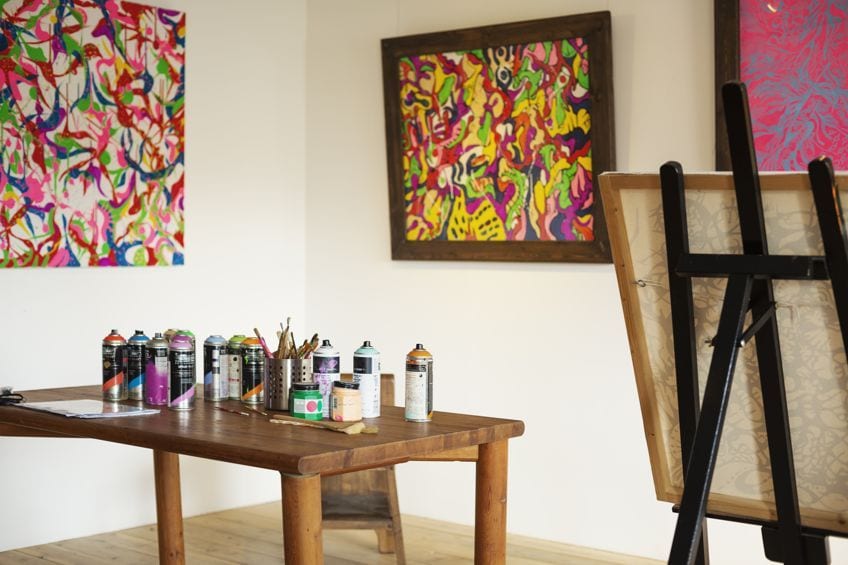
Gear for Protection
Fumes from spray paint are a hazard for your health if inhaled, this is why wearing a protective mask is so important. As spray paint also causes some over-spray which could land up in your eyes, so donning a pair of goggles is a very good idea when doing any kind of spray paint art or similar.
A long-sleeved top and pants along with gloves are also highly advisable to prevent the spray paint from getting on your skin.
Spray Paint Cans
This one goes without saying, you will obviously need cans of spray paint to do your spray paint art techniques! There are so many brands to choose from and so many different colors available depending on your needs. Many spray paints can be used both indoors and outdoors and on various surfaces including metal or wood.
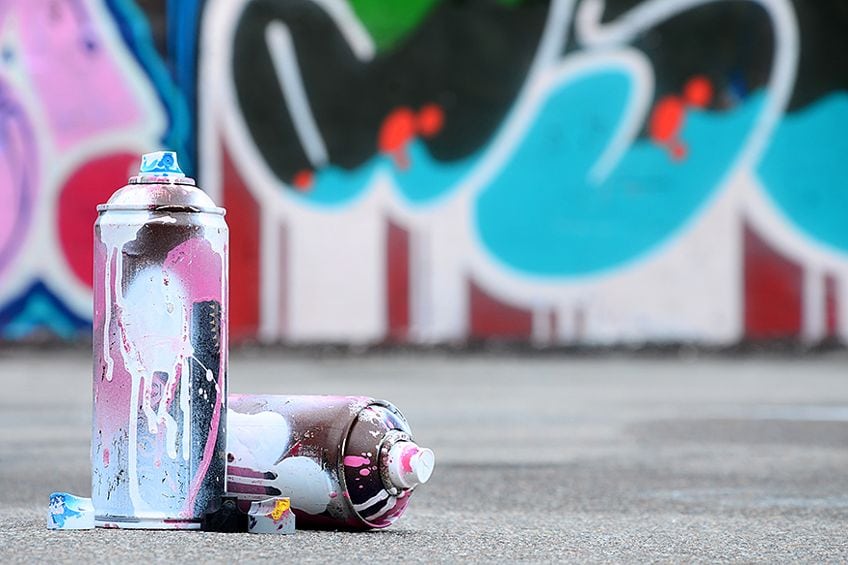
Spray painting for beginners is best done using craft-grade spray paints rather than those created for industrial applications. Do your research before purchasing and take note of the available finishes. Every brand has its own formula so some colors will not look the same in every brand.
A Surface to Paint On
When starting out, spray painting on canvas or poster boards is a good place to start. Even though we always see street spray painting art, it is not an easy skill to master and needs patience and practice. It is also far more affordable to practice on board or canvas.
A thick smooth poster board is also an ideal surface to start with as it is affordable and available in bulk.
Cleaning Materials
If you have never spray painted before, you should know that it can be very messy! Grab some old newspaper or tarp and cover up anything and everything! Spray paint has a knack for finding its way onto floors and furniture. Having some paint thinners on hand is a good idea to get small accidents cleaned up as they happen.
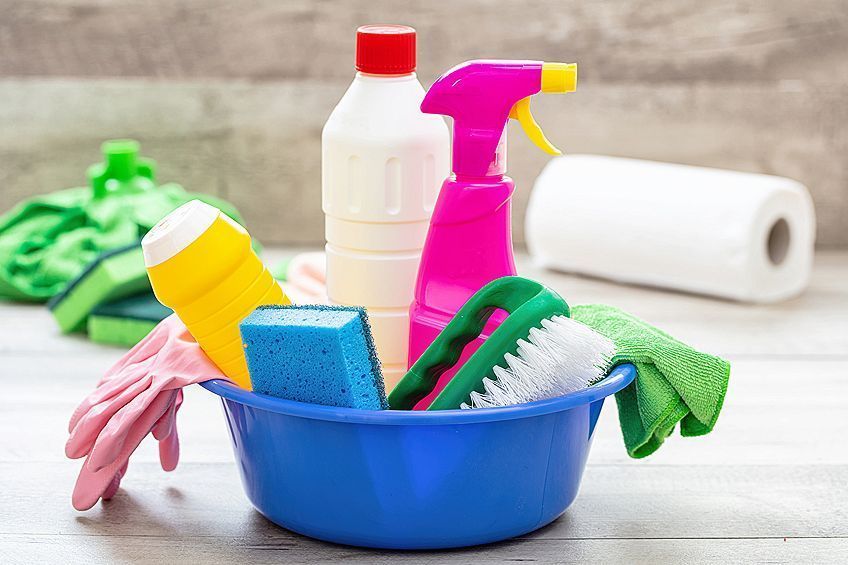
Old Newspaper or Magazines
If you want to add texture to your artwork, magazines are an excellent tool! Simply use some glossy paper to help remove paint and also add some texture to your artwork. Some newspaper also makes for the perfect cover on surfaces you do not want to get any paint on.
Lay down a protective layer or you may have a lot of clean-up after you are done with your artwork.
Tools and Stencils
If you are unsure of what you want to paint, some stencils could be the perfect tool to get your creative juices flowing. Add some detail or images in the form of numbers, letters, or any shape or form you prefer! You could try making your own stencils or purchase a set. There are so many unique and different stencils to choose from!
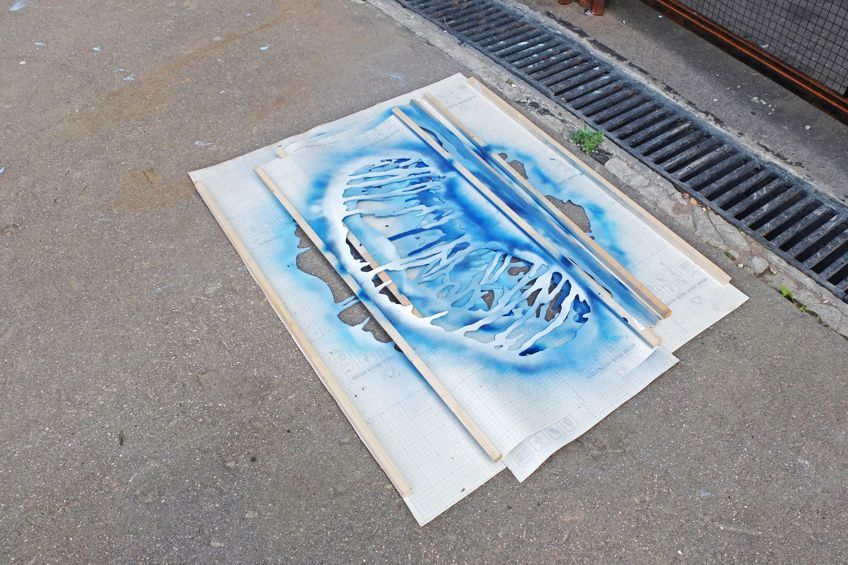
You really do not have to be able to draw well nor paint like a professional, abstract spray paint art is all perspective. Use some masking tape to help create unique designs or shapes and simply peel the tape off once your spray paint has dried fully. Here are some more awesome effects you can create with basic tools, many of which you will have at home already:
- Toothbrushes, paintbrushes, pieces of foam, or sponges can all create various textures
- A pallet knife can be useful in numerous ways if used while the paint is still damp
- Container lids make for perfect circle-shaped stencils
How to Make Spray Paint Art
Before you can begin to create your spray paint artwork it helps to have an idea of what you want to paint and do. Sometimes it helps to draw inspiration from other art, so have a look online and see what is out there! Try to map out where various elements will be. If you are painting on a canvas, place your various tools, such as container lids, where you plan to use them. Remember that spray painting involves creating layers and textures. Also do not be discouraged, spray painting takes a lot of practice.

Now that you know what you want to do and where you will place certain textures and elements, you can gather your supplies. If you are painting on a wall, be sure that you have written permission to paint on it, or you could land up in some trouble! If you do not have a wall or are only just starting out, get some poster board for practice. A fun and easy paint idea is a cosmic scene or nebula. This effect is fun to create and quite easy to do, even for a beginner.
Spray Paint Tutorial: Cosmic Spray Paint Effect
Find a well-ventilated space without a draft. Any wind will carry your paint away from your project, but at the same time, you do not want to be stuck inside a stuffy space. Make sure you have your gloves on, protective eyewear, and your mask. Do not forget to cover up any space or area you do not want to get paint on. Here is what you will need:
- At least five different color spray paints
- Round container lids in various sizes, to create planets
- Posterboards
- A Glossy magazine
- Some tape
Now that your table and other surfaces are covered and protected, you can use tape to secure your poster board down. Everything else you plan to use should also be within reach. Do not forget to shake the can before each and every use.
Step 1
Select your round-shaped items such as lids and place them on the board where you want your planets to be. Firmly hold the lid in place while you spray with light pressure around it. When the paint is dry, lift the lid. Repeat wherever you want on your poster board.
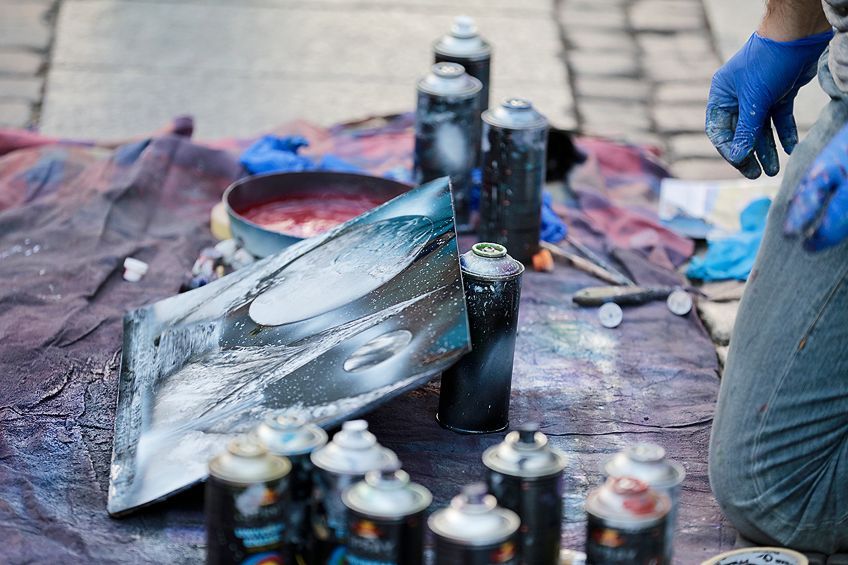
Step 2
Now, you can begin to add more color and texture to each planet. Overlap the colors starting from light to dark. For example, yellow then green then blue and finally, black. Move from left to right to cover the circle. Do not worry if you spray over the round markings you made.
You can make each planet a different color if you want to. Some can be done from dark to light.
Step 3
When you are finished spraying but the paint is still wet, crumple up a sheet of glossy magazine paper. A plastic bag is also an option. Open the paper and place it over your painted and damp planet. Run your finger over the paper and then lift it off. Do you notice the interesting texture? You can now do this for all your planets.
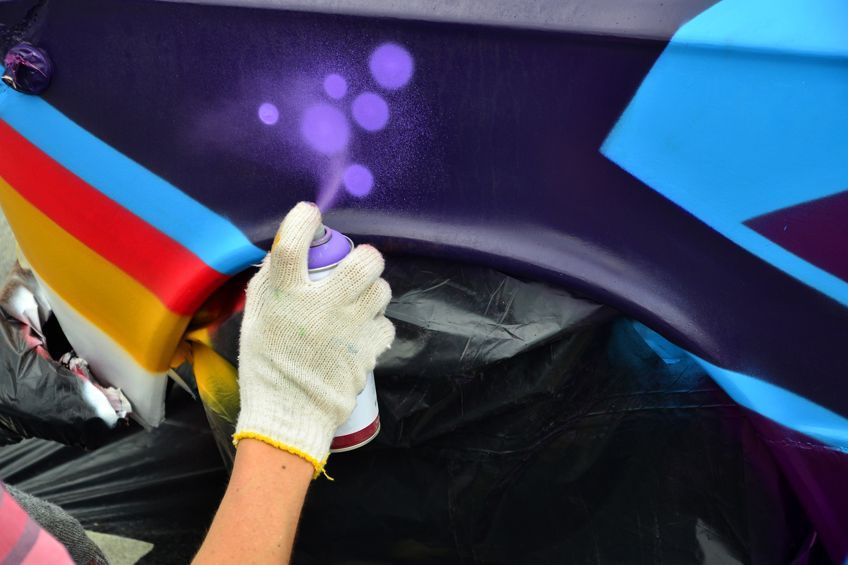
Step 4
Using the same round lids from before, place them back over the planets. You will now spray the background and add all the details of outer space. Starting in one corner, perhaps with a dark color like black or dark blue.
Then select another color in a lighter color such as yellow or orange to help create the effect of lighting.
Step 5
You can now add your stars! This is quite a fun step. Take a piece of cardboard and spray white paint right onto the corner. Make sure it is very thick and wet. You can take this board and flick it, causing the white paint to splatter across the image. You could also use a toothbrush for this effect. If you want to add a comet, hold your spray can upside down and hold onto the nozzle. Push quickly and spray in the direction of your choosing. This should result in a comet-like tale effect.
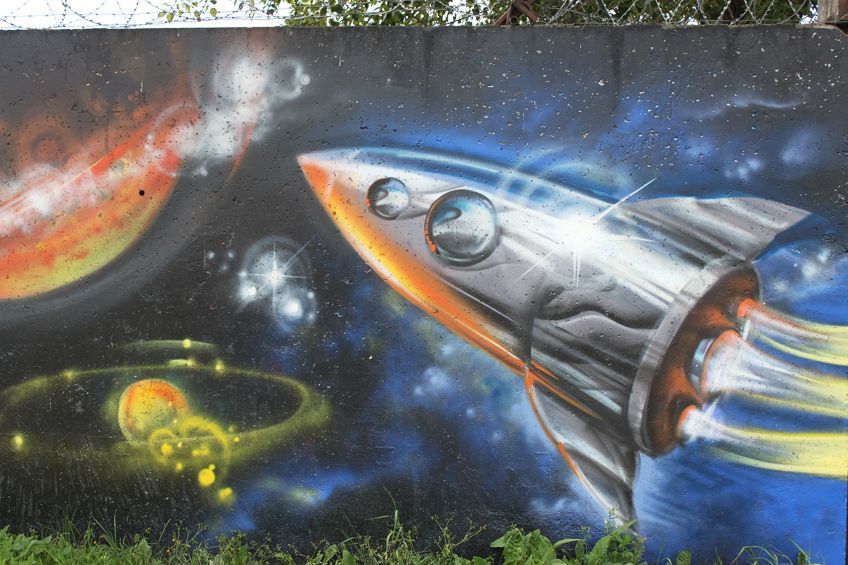
Using Stencils for Spray Painting on Canvas
If you are working on canvas, you can quickly and relatively easily create a beautiful piece of art! One of the best ways to achieve an awesome work of art is by using stencils. All you need to do is place your chosen stencil on your canvas and spray paint over it. When you remove the stencil, you will notice the shape that was sprayed is left behind. When looking for stencils, you will have many options, some are quite simple and basic like these letters, while other designs are more elaborate, such as this set of floral mandalas. You also are not limited to just using one color, try blending colors to create an ombre effect.
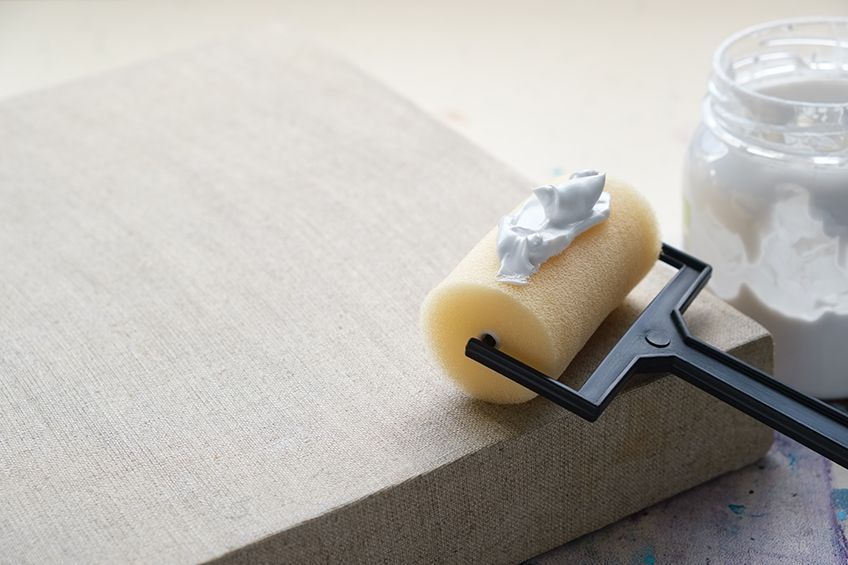
Bear in mind that while you spray, you might have overspray or seepage of paint on areas where none is desired. Masking tape can help, and to prevent paint from seeping through, use a thick board for your artwork. As mentioned before, masking tape can also act as a stencil, just stick the tape where you do not want any paint to be, for example in a plaid pattern. Other interesting items you could use include leaves or flowers! Here is what you will need to do stencil art shapes using leaves on your canvas artwork:
- A canvas and gesso if needed
- Some newspaper
- Spray paint colors
- Leaves or a leaf
- Gloves, a mask, and some protective eyewear.
- A paintbrush
- Acrylic paint
- Repositionable spray adhesive
Step 1
If you want good results, prime your canvas and wait at least 24 hours before you apply any paint. You should use gesso to prime your canvas.
There are also pre-primed canvases available should you wish to skip this step.
Step 2
Prepare the area so that clean-up will be quick and easy, use newspaper or tarp to cover your surface and surrounding area to protect them from the spray paint. Now, paint your base coat color onto your canvas and allow it to dry.
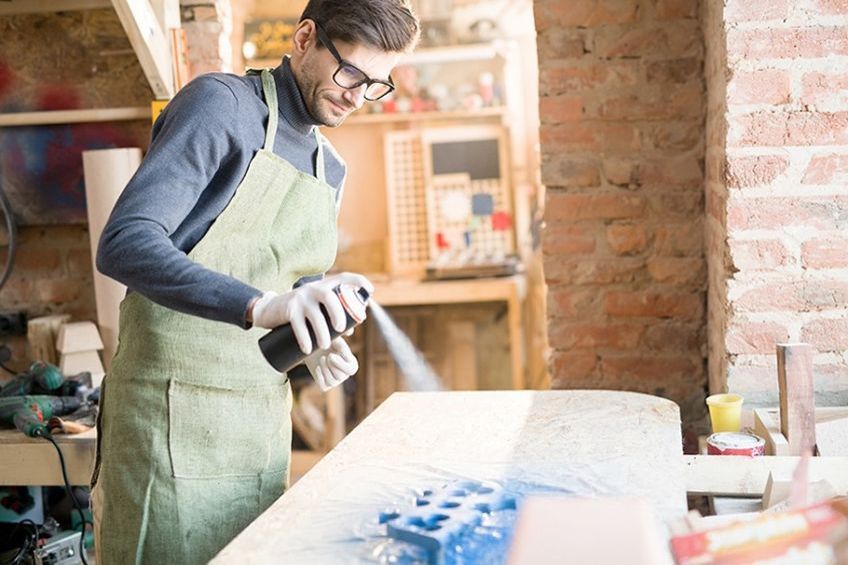
Step 3
Put your chosen leaf on the newspaper and spray some Repositionable spray adhesive onto the leaf.
Take your leaf and lace it adhesive side down onto your canvas.
Step 4
Now, choose another spray paint color that is contrasting to the color you chose to paint your canvas. If your canvas is dark blue, use white, and so on. Spray your leaf and canvas. You will not need more than one coat as you still want your base color to slightly show through.
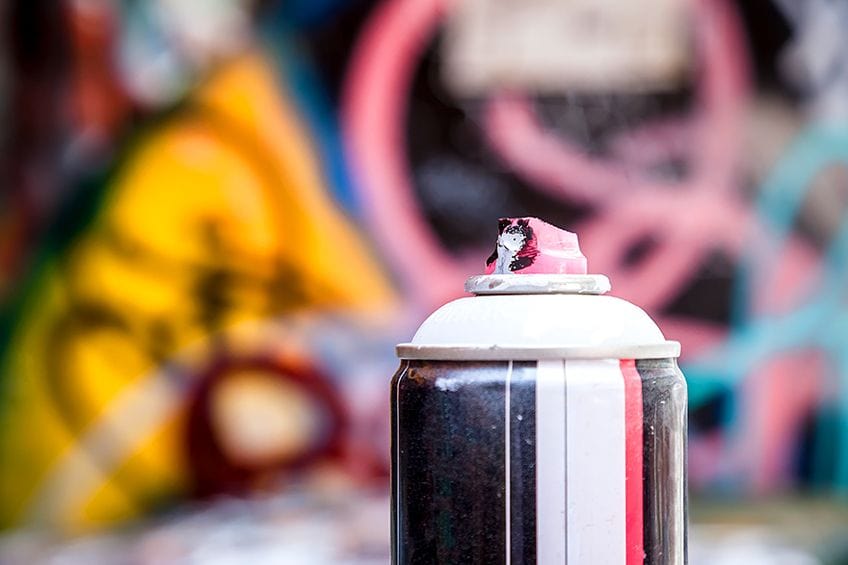
Step 5
Allow it to dry but not entirely. Now, carefully remove your leaf. Let your entire canvas dry for about 24 hours. Feel free to add a varnish or sealer or some clear top coat on your finished work. Let it dry slightly but not completely before carefully removing the leaf stencil. Allow this to then dry completely for at least 24 hours.
You can add a clear topcoat or varnish sealer if you wish before displaying your art piece.
Other Spray Paint Art Techniques
As with all art forms, practice makes perfect. Experimentation is always encouraged! When you are learning to spray paint, keep practicing until you are comfortable entirely with using the paint cans before moving on to larger and more intricate projects. You also do not only have to use paint when creating your artwork, use some glossy magazines that have been scrunched up or even some foil to create texture on damp paint. Create more dimension with a sponge, paintbrush, or even an old toothbrush. There are so many ways you can add elements to your art, all you need to do is look around and you are bound to find something to use. Make sure your design is thought out prior to starting because spray paint dries very quickly, so you need to work fast.
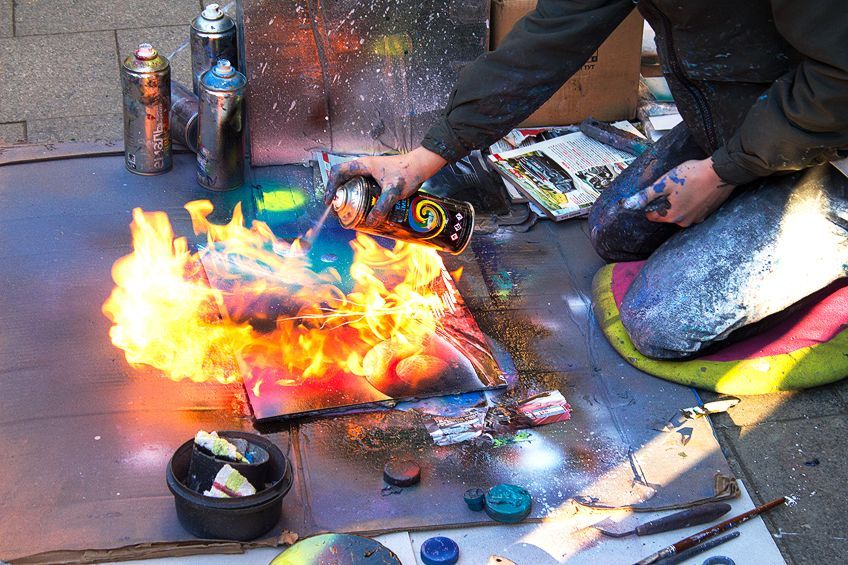
An important part of spray painting is not to stand too close while you spray. If you do not stand back, you will have less control over the spray can and problems like drips can occur because it is too wet. Another thing to remember is to allow each coat to dry before you apply your next paint layer. Here are a few more spray paint art techniques you can use at home:
- It is very important to shake the spray paint can before each use.
- Store your paint in a cool dark place as temperature influences the paint dramatically.
- Work when the weather is cooler.
- Each layer should be fully dried before applying the next one because spray paint dries quite fast.
- Round shapes can be created by using caps and lids of containers.
- Art-specific spray paint will offer you more control when compared to traditional spray paint.
- Stand back when you spray, if you stand too close or hold the can too close to your wall or canvas, your layers will be too wet and too thick.
Now that you know more about the exciting world of spray paint art, what will you create? The possibilities are endless! There are so many beautiful colors and finishes available to choose from and you can try using many different tools and elements to bring life and texture to your artwork. We hope this article was informative and will inspire you to grab some spray paint and start experimenting! Happy Painting!
Frequently Asked Questions
Can I Do Spray Paint Art on Paper?
Yes, paper is great for practicing your spray paint art. Make sure to use thicker paper to prevent any seepage of the paint. Canvas is preferred over paper, alternatively, some glossy posterboard is often ideal and will add more gloss to your finished artwork, too.
Is a Sealant Needed Over a Surface That Has Been Sprayed?
No, you do not need to cover your artwork in sealant. That said, if you would like to keep your spray paint art protected from dust, light, and moisture, you most certainly can add a matte or gloss varnish over the surface.
Why Is There an Age Limit for Purchasing Spray Paint in the United States?
Yes. This is because many people abuse spray paint and inhale it. This is why in the United States, stores will ask for proof and identification that you are over the age of 18. The hope is also to prevent youth from purchasing spray paint for vandalism purposes.
Should I Use a Primer When Doing Spray Paint Art?
Unlike most paint jobs, should you use primer-containing spray paint, you will end up with dull colors. Spray paints without primer usually have bolder and more vibrant colors than those with primer.
What Are the Different Types of Spray Paint Available?
There are so many different types of spray paints on the market today, each one is created for a specific purpose and application. Some spray paints are specifically formulated for industrial purposes and others are purely for arts and crafts projects. There are also many colors and finishes available, such as chalk, mirror, and gloss. The majority of spray paints are oil-based; however, some are acrylic based and there are even some water-based options on the market.
In 2005, Charlene completed her Wellness Diplomas in Therapeutic Aromatherapy and Reflexology from the International School of Reflexology and Meridian Therapy. She worked for a company offering corporate wellness programs for a couple of years, before opening up her own therapy practice. It was in 2015 that a friend, who was a digital marketer, asked her to join her company as a content creator, and this is where she found her excitement for writing.
Since joining the content writing world, she has gained a lot of experience over the years writing on a diverse selection of topics, from beauty, health, wellness, travel, and more. Due to various circumstances, she had to close her therapy practice and is now a full-time freelance writer. Being a creative person, she could not pass up the opportunity to contribute to the Art in Context team, where is was in her element, writing about a variety of art and craft topics. Contributing articles for over three years now, her knowledge in this area has grown, and she has gotten to explore her creativity and improve her research and writing skills.
Charlene Lewis has been working for artincontext.org since the relaunch in 2020. She is an experienced writer and mainly focuses on the topics of color theory, painting and drawing.
Learn more about Charlene Lewis and the Art in Context Team.


